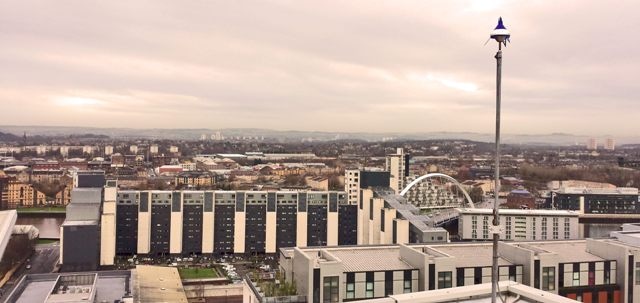Jul 7 2016
A collaborative project based out of Glasgow is leading the way for the next phase of internet technology - the Internet of Things (IoT). Stream Technologies, Boston Networks, Semtech Inc., and CENSIS are the participants of this project. An agreement was reached at Mobile World Congress in Shanghai to roll out the next wave of the design’s evolution.
 Stream Glasgow Skyline
Stream Glasgow Skyline
The group partnered with Glasgow University, Glasgow Caledonian University, and Strathclyde University, and installed a wireless IoT network spanning 12 km2 across the city, including the Merchant City, the commercial centre, and the West End. The network will enable the progress and application of devices such as pollution sensors, building and indoor environmental monitors, social care gadgets designed to assist independent living, and tags to track valuable assets.
Semtech’s LoRa® geolocation solution is used currently to monitor air quality and improve smart transport systems. This solution can now be adapted to help deliver the next wave of the technology, with more capabilities than ever before. The network is now capable of identifying the location of devices without requiring additional battery power, creating potential for a lot of new applications.
The system offers comparatively lower power and an inexpensive way of connecting formerly isolated devices, providing developers, businesses and the public, a chance to develop their own IoT infrastructure, capable of building and demonstrating new business solutions.
The low power wide area network technology has been dubbed LoRaWAN™, which can be applied in a range of circumstances, e.g. waste operators wanting to supervise the location of their skips across a city, or by healthcare providers following the behavior of patients living with dementia.
Location determination without power drain, three-kilometer urban range, and five-year battery life potential are the three key features that will be the game changers in providing IoT connectivity to a new range of devices and applications.
This is an exciting development in the story of the IoT and the next wave of internet technology. The LoRaWAN network we’ve set up in Glasgow is one of the most advanced in the world – and is the perfect demonstrator for how it can be rolled out across other cities. The model will allow businesses to start up their own IoT networks with just one or two devices, and scale-up to the point where they have hundreds, or even thousands, of connected ‘things’. That might sound like it is purely focused on technology companies, but the network could be used by practically any organization – or even individuals. Its potential is awe-inspiring and it’s happening right here in Glasgow city centre.
Nigel Chadwick, CEO of Stream Technologies
The revolutionary LoRa® technology for IoT applications is Semtech’s creation. The company has recently added geolocation capability of devices when messages are received by a number of base stations.
Richard Lansdowne, Senior Director of Network System Solutions for Semtech’s Wireless and Sensing Product Group, said: “Semtech needed a representative deployment in both urban and non-urban environments to extensively test our new LoRa geolocation hardware and software, and since the other members of this collaboration have already been successfully working together with LoRaWAN for some time, this was a great opportunity to do so. This project is a valuable opportunity for our team and has helped move the successful deployment of our LoRa geolocation solution forward.”
Glasgow was chosen as the trial case as it has many similarities to major metropolitan cities worldwide. The city consists of a grid system matching major US conurbations, a mix of urban and extra-urban environments, and older historic spaces – all of which are perfect for evaluating low-power radio network performance.
This network has the potential to attract many multinational technology companies to the city. It will also promote the development of new businesses in the city. The companies and businesses will be keen to exploit the technology and create new services, products, and applications on the back of its execution.
Going forward, the group is planning to install a similar sensor network in Inverness to observe conditions in highly rural environments.
Scott McEwan, Chief Executive of Boston Networks, commented, “As a Glasgow based company, we used our local knowledge and experience of wireless technologies to support Stream Technologies to deploy the advanced LoRaWAN network. The implications of the emergence of disruptive technologies, such as LoRaWAN have enormous potential to revolutionize the future of the IoT. To have one of the most advanced LoRaWAN networks which will permit urban infrastructure to become more intelligent – and all right on our doorstep, is an exciting prospect.”
This isn’t about providing faster broadband to businesses – it’s about connecting devices that are currently excluded from the internet and providing services which are not currently possible. LoRaWAN technology is set to address some of the key challenges in the IoT, making long-term battery-powered wireless monitoring possible, with the additional benefit of real-time location information. With fewer than 10% of the predicted 30 billion nodes by 2020 likely to be connected to the internet using cellular technology, networks like LoRaWAN are going to become increasingly important. It has the potential to be as disruptive to businesses as the internet has been already to daily life – and, with the conclusion of this agreement in Shanghai, Scotland is at the forefront of making that happen.
Mark Begbie, Business Development Director at CENSIS
Stuart Patrick, Chief Executive of Glasgow Chamber of Commerce, said, “Glasgow is once again leading the way in the technological development of its city centre. Making our urban zones smarter is important for future management and its fantastic to see a collaboration of this scale. An advanced IoT network will bring many benefits, not only to the people living and working in the city, but the region’s overall economy as businesses specialising in the sector are attracted to our offering.”